unit 5 our school life课件
仁爱版七年级课文翻译:Unit 5 Topic 2

Topic 2 A few students are running around the playground.一些学生正绕着操场跑步
迈克尔:你好,简!我是迈克尔。你现在在做什么? 简:猜猜! 迈克尔:你在做作业吗? 简:不,没有。 迈克尔:你在看电视吗? 简:是的,我在看电视。你呢? 迈克尔:我在做卡片,但是很无聊。 你想去打篮球吗? 简:好主意!一会儿见。 迈克尔:一会儿见。 李明:打扰了,我可以借一些英语练习册吗? 女孩:当然可以。许多学生正使用它们。 女孩在书架上找书。 女孩:给你。 李明:太棒了!我能借多久? 女孩:两周。你必须按时归还。 李明:当然,我会的。谢谢你。 女孩:不用谢。 康康:打扰了,你有英语报纸吗? 女孩:对不起,我们没有。 康康:还是要谢谢你。再见! 女孩:再见! 女孩:我能帮助你吗? 麦克:我在找我的钱包。 女孩:钱包是什么颜色的? 麦克:蓝色的。 女孩:钱包里面有什么? 麦克:里面有我的全家福,还有一些钱。 女孩:哦。这里有一个钱包,但不是你的。 麦克:还是谢谢你。 王老师正领着一位新学生参观学校。 在操场上。 一些学生正绕着操场跑步。 一些学生正在举行足球赛。 一些学生正在打篮球。 看!还有许多学生坐在那儿观看。 在体育馆。 有三个学生在游泳。 那边的女孩们在干什么? 哦!她们正在跳舞。 但是海伦没有和她们一起跳舞。
她正在和安打乒乓球。 在教室里。 看看你的同学们。 他们没在上课。 康康在读英语报。 迈克尔在做作业。 王伟也在做作业吗? 哦!不,他在写信。 简和玛丽亚正在做什么? 她们正在谈话。 萨莉在哪儿? 啊哈,她在擦教室后面的黑板。 文伟是我的好ห้องสมุดไป่ตู้友。 这儿有一些他的照片。 看!第一张照片上,他在体育馆里跑步。 第二张照片上,他在游泳池里游泳。 他看起来很高兴,因为他喜欢游泳。 第三张照片上,他在长城上和一个日本女孩谈话。 长城很雄伟。 我也想有一天去那儿参观。
仁爱版七年级英语下册 Unit 5 Our school life 常用介词的用法与区别

常用介词的用法( 1)on表示时间,后跟日期、星期几、具体时间或含有日期和星期几的时间状语,意为“在······”。
on Monday(在星期一), on the morning of October 1(在10月1日的早上), onthat day(在那天), on a cold morning(在一个寒冷的早上)表示位置,“在······上”。
There are some pictures on the wall.墙上有些图画。
表示处境,“从事...”。
He is working on maths problems.他在研究数学问题。
用在短语中:on foot(步行), on the right(在右边), on holiday(度假)等。
(2) by乘,坐by bus/bike/car/air/subway/boat/ship等。
They seldom go to school by subway.他们很少乘坐地铁上学。
通过,靠……,借助于……They honor their parents by giving cards and gifts.他们通过送卡片和礼物以表示对父母的尊敬。
( 3)for表示原因,“由于……”。
Thank you for your hard work.谢谢你努力工作。
表示目的,“为了……”。
I come here for my parents.我是为了我的父母亲来这儿的。
表示用途,“作为……”。
What do you have for lunch?午餐你吃什么?(4) from自从,来自He is from China.他来自中国。
表示间隔、距离,“离……”。
How far is your school from here?你学校离这儿有多远?用在短语中:be different from(与······不同), from ···to···(从······到……), come from(来自)等。
中职英语课件 school life【优质PPT】
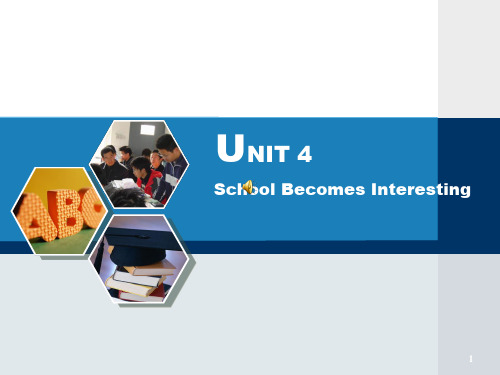
17
Listening and Speaking
Decide true ( T ) or false ( F ) .
1. Lin Wei’s school is the same as other high schools.
n. 工厂
10
Warming up
Answer the questions. 1. How many hours do you study in the classroom every day? 2. Do you have PE class? 3. Do you go to workshops or factories to learn practical skills?
beside
2. Besides / Beside Chinese, I also study English and French.
Besides
3. I always go to school on / by foot.
on
4. This school is different from / with other schools. from
Learning Tips:
阅读英文文章时,无须
对每一个词都同等重视。可
以采用跳读法,即让目光从
一个“字群” 跳到另一个
“字
群”,从一个主要信息跳到
9
For Better Performance
10
My Progress Check
3
七年级英语下册Unit5OurschoollifeTopic3MyschoollifeisveryinterestingSectionB教案(新版)仁爱版
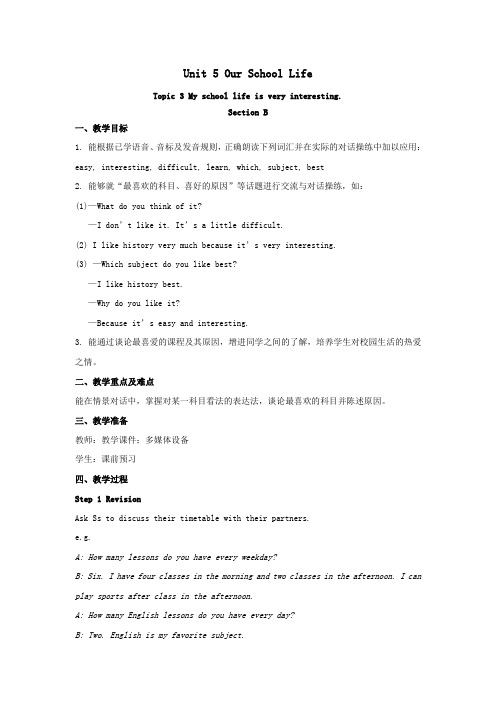
Unit 5 Our School LifeTopic 3 My school life is very interesting.Section B一、教学目标1. 能根据已学语音、音标及发音规则,正确朗读下列词汇并在实际的对话操练中加以应用:easy, interesting, difficult, learn, which, subject, best2. 能够就“最喜欢的科目、喜好的原因”等话题进行交流与对话操练,如:(1)—What do you think of it?—I don’t like it. It’s a little difficult.(2) I like history very much because it’s very interesting.(3) —Which subject do you like best?—I like history best.—Why do you like it?—Because it’s easy and interesting.3. 能通过谈论最喜爱的课程及其原因,增进同学之间的了解,培养学生对校园生活的热爱之情。
二、教学重点及难点能在情景对话中,掌握对某一科目看法的表达法,谈论最喜欢的科目并陈述原因。
三、教学准备教师:教学课件;多媒体设备学生:课前预习四、教学过程Step 1 RevisionAsk Ss to discuss their timetable with their partners.e.g.A: How many lessons do you have every weekday?B: Six. I have four classes in the morning and two classes in the afternoon. I can play sports after class in the afternoon.A: How many English lessons do you have every day?B: Two. English is my favorite subject....【设计意图】复习上节课所讲内容。
英语仁爱版七年级下册第五单元Unit 5 Our school life知识点整理

Unit 5 Our school lifeTopic 3 My school life is interesting.一、重点词汇及短语:1.单词:Today adv在今天n 今天, Wednesday n 星期三, Monday n 星期一, physics n 物理, Tuesday n 星期二,geography n 地理,Thursday n 星期四, P.E. n 体育,Friday n 星期五, art n 美术, history n 历史, math n 数学, science n 科学, learn v 学习, easy adj 容易的, interesting adj 有趣的, difficult adj 艰难的, boring adj 无聊的, which pron 哪一个, subject n 学科, best adv&adj 最好地(的), between prep 在(两者)之间, Saturday n 星期六, February n 二月, hard adj 努力的adv 努力地, story n 故事friendly adj 友好的world n 世界attention n 注意stamp n 邮票,night n 夜间, place n 地点,program n 节目,newspaper n 报纸.2.短语:be over 结束outdoor activity 室外活动wait for sb 等待某人every week 每周have an English class 上英语课my school life 我的学校生活not…at all 一点也不,根本不be friendly to…对……友好learn…from…从……中学习……on Wednesdays 在星期三work on 从事from…to…从……到……二、词组例析:1.outdoor activity 室外活动activity是可数名词,其复数形式是把y变i 再加-es。
七年级英语下册Unit5OurschoollifeTopic1IusuallycometoschoolbysubwaySectionB教案(新版)仁爱版
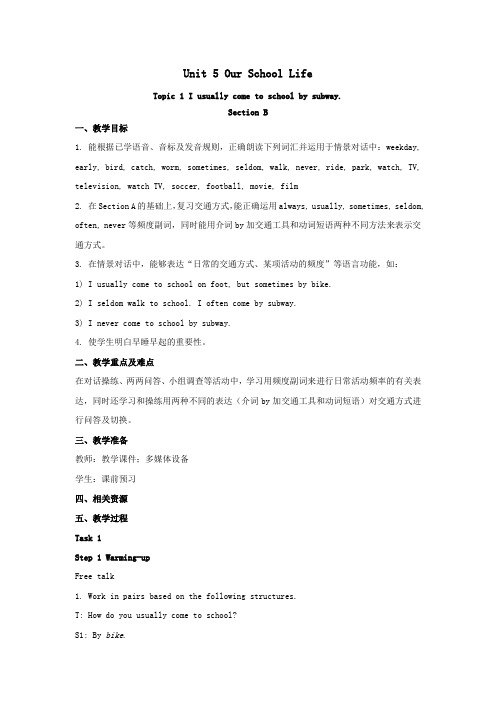
Unit 5 Our School LifeTopic 1 I usually come to school by subway.Section B一、教学目标1. 能根据已学语音、音标及发音规则,正确朗读下列词汇并运用于情景对话中:weekday, early, bird, catch, worm, sometimes, seldom, walk, never, ride, park, watch, TV, television, watch TV, soccer, football, movie, film2. 在Section A的基础上,复习交通方式,能正确运用always, usually, sometimes, seldom, often, never等频度副词,同时能用介词by加交通工具和动词短语两种不同方法来表示交通方式。
3. 在情景对话中,能够表达“日常的交通方式、某项活动的频度”等语言功能,如:1) I usually come to school on foot, but sometimes by bike.2) I seldom walk to school. I often come by subway.3) I never come to school by subway.4. 使学生明白早睡早起的重要性。
二、教学重点及难点在对话操练、两两问答、小组调查等活动中,学习用频度副词来进行日常活动频率的有关表达,同时还学习和操练用两种不同的表达(介词by加交通工具和动词短语)对交通方式进行问答及切换。
三、教学准备教师:教学课件;多媒体设备学生:课前预习四、相关资源五、教学过程Task 1Step 1 Warming-upFree talk1. Work in pairs based on the following structures.T: How do you usually come to school?S1: By bike.T: How do you usually go to the zoo?S2: By bus.2. Choose a few pairs to act them out.【设计意图】复习上节课所学知识点,培养学生口语表达能力。
人教版初中英语江西中考一轮中考话题复习话题 School life 课件(共31张PPT)

( )1.Most children in England go to middle school at age_____. A.ten B.eleven C.twelve D. thirteen ( )2.90% of English children go to a state school because_____ A. they can get better education B.they can have more holidays C.they don't need to pay for money D.they are too poor to and weak ( )3.what does the underlined world ”terms” in the passage. A.school years B.school report C.school holiday D.school play ( )4.Which of the following is TRUE according to the passage? A. The spring term in England is from January to July. B. Children in England had the same long holiday as in China. C. During break times, the children go out and play on the playground. D. On rainy days, kids usually have an-hour-long lunch in the classroom.
Tapescript
Thinking back to the past three years, I find there are so many unforgettable things and moments. We are busy, because we must arrive at school on time and then we have eight classes every day. But learning with classmates is never boring. Miss Chen teaches us math. She is quite strict but patient. When I got the first A+ on my math, she praised me happily and I was encouraged a lot. I like sports, so I joined the tennis club. We used to spend much time practicing after school. In front of the teaching building is a big tree, and we often play games there. But my favorite place is always our school library. Once in a while, I enjoy reading there, especially when I’m down. If you have time, I can show you around our school!
Unit 5 Our School Life
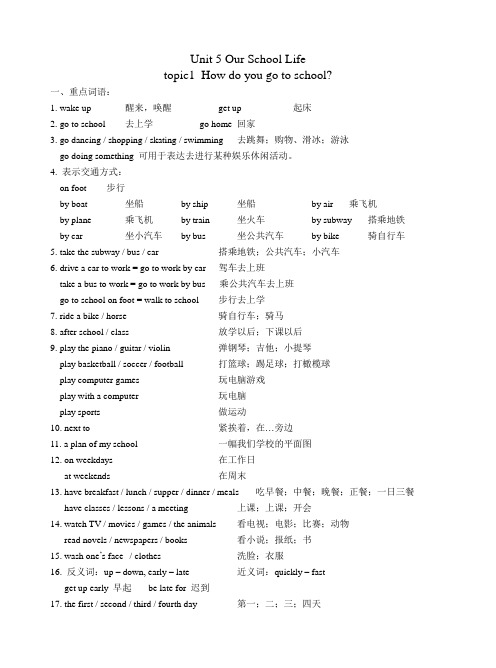
Unit 5 Our School Lifetopic1 How do you go to school?一、重点词语:1. wake up 醒来,唤醒get up 起床2. go to school去上学go home 回家3. go dancing / shopping / skating / swimming 去跳舞;购物、滑冰;游泳go doing something 可用于表达去进行某种娱乐休闲活动。
4. 表示交通方式:on foot 步行by boat 坐船by ship 坐船by air 乘飞机by plane 乘飞机by train 坐火车by subway 搭乘地铁by car 坐小汽车by bus 坐公共汽车by bike 骑自行车5. take the subway / bus / car 搭乘地铁;公共汽车;小汽车6. drive a car to work = go to work by car 驾车去上班take a bus to work = go to work by bus 乘公共汽车去上班go to school on foot = walk to school 步行去上学7. ride a bike / horse 骑自行车;骑马8. after school / class 放学以后;下课以后9. play the piano / guitar / violin 弹钢琴;吉他;小提琴play basketball / soccer / football 打篮球;踢足球;打橄榄球play computer games 玩电脑游戏play with a computer 玩电脑play sports 做运动10. next to 紧挨着,在…旁边11. a plan of my school 一幅我们学校的平面图12. on weekdays 在工作日at weekends 在周末13. have breakfast / lunch / supper / dinner / meals 吃早餐;中餐;晚餐;正餐;一日三餐have classes / lessons / a meeting 上课;上课;开会14. watch TV / movies / games / the animals 看电视;电影;比赛;动物read novels / newspapers / books 看小说;报纸;书15. wash one’s face / clothes 洗脸;衣服16. 反义词:up – down, early – late 近义词:quickly – fastget up early 早起be late for 迟到17. the first / second / third / fourth day 第一;二;三;四天18. clean the house 打扫房子19. 表示建筑物(尤其学校建筑物):on the playground 在操场at school / home / table 在学校;家里;桌旁in a computer room / teachers’ office / classroom building / gym / library / lab / canteen在电脑室;教师办公室;教学楼;体操馆;图书馆;实验室;食堂20. around six o’clock = at about six o’clock 大约在六点21. 频率副词:never, seldom, sometimes, often, usually, always二、重点句型:1. It’s time to get up. 该起床的时候了。
Unit 5 Topic 2(复习课件) -2022-2023学年七年级英语下册单元复习(仁爱版)
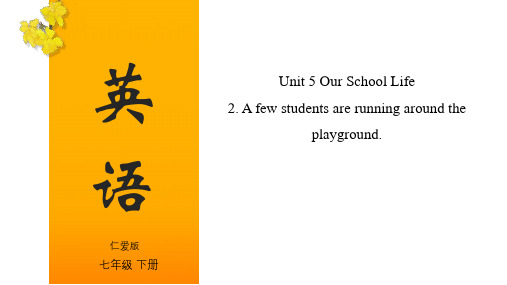
轻轻松松进课堂
In the gym
插入新教材P13 1a 图 2
The girls over there are dancing. Helen and Ann are playing ping-pong. Three students are swimming in the swimming pool.
轻轻松松进课堂
1a. Look at the pictures and describe what the students are doing.
In the classroom
Kangkang is reading English newspapers. Michael is doing his homework. Wang Wei is writing a letter. Jane and Maria are talking. Sally is cleaning the blackboard at the back of the classroom.
?
Is Jim ... in the classroom?
Yes? No?
Yes, he is listening to music in the classroom.
轻轻松松进课堂 Guess what they are doing in the gym.
?
Are they ... in the gym?
制作卡片 好主意 客厅 教师的办公室 教学楼 游泳池 用电话 在操场上 在体育馆 打扫卫生
make cards good idea dining hall teachers’ office classroom building swimming pool on the phone on the playground in the gym do some cleaning
Howdoyouusuallycometoschool
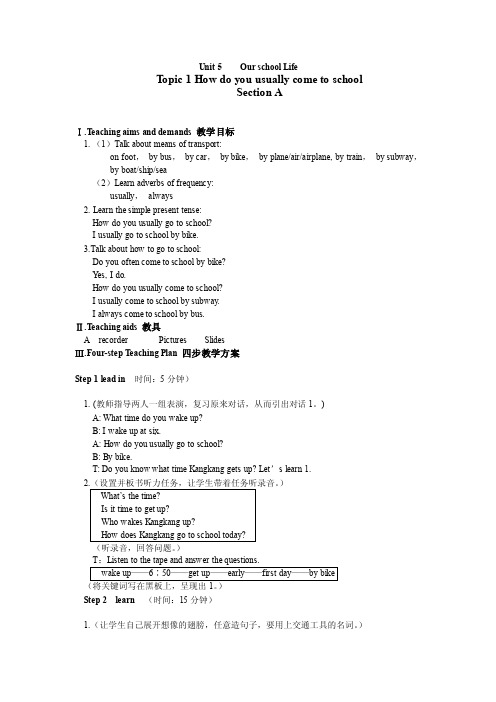
Unit 5 Our school LifeT opic 1 How do you usually come to schoolSection AⅠ.T eaching aims and demands 教学目标1. (1)Talk about means of transport:on foot,by bus,by car,by bike,by plane/air/airplane, by train,by subway,by boat/ship/sea(2)Learn adverbs of frequency:usually,always2. Learn the simple present tense:How do you usually go to school?I usually go to school by bike.3.Talk about how to go to school:Do you often come to school by bike?Y es, I do.How do you usually come to school?I usually come to school by subway.I always come to school by bus.Ⅱ.T eaching aids 教具A recorder Pictures SlidesⅢ.Four-step T eaching Plan 四步教学方案Step 1 lead in 时间:5分钟)1. (教师指导两人一组表演,复习原来对话,从而引出对话1。
)A: What time do you wake up?B: I wake up at six.A: How do you usually go to school?B: By bike.T: Do you know what time Kangkang gets up? Let’s learn 1.2.(设置并板书听力任务,让学生带着任务听录音。
Topic+5+School+life(校园生活)-2023年中考英语话题复习精美课件

用短语的适当形式填入对应的微语段练短语中。
短语默写
学校活动
6. _t_r_y_o_u_t__________参加……选拔;试用
1. d_o__(o_n__e'_s_)_h_o_m__e_w_o_r_k___做作业 7. _d_iv_i_d_e_.._.i_n_t_o______把……分成……
2. s_p_e_a_k__E_n_g_l_is_h_____说英语 8. _p_u__t _o_ff__________推迟
Graduation毕业季——Look forward to a bright future展望美好未来
end 结尾
student 学生
leave (left, left) 离开
classmBiblioteka te同班同学part 离开
expect 期待
separate 分开
hope 希望
party 聚会
plan 计划
Passage 2
paper paint lesson classroom picture All my teachers and classmates praised my designs(设计)) for the art festival. They think I have a real gift for 1. _p_a_in_t_i_n_g_. However, I once did not like art 2. _l_e_s_so_n__s_ because I could not draw very well. One day, I was playing with some paint as usual in the 3. c_l_a_s_sr_o_o_m__, I mixed the paint with water.
仁爱版七年级下册Unit5_Topic1_知识点归纳
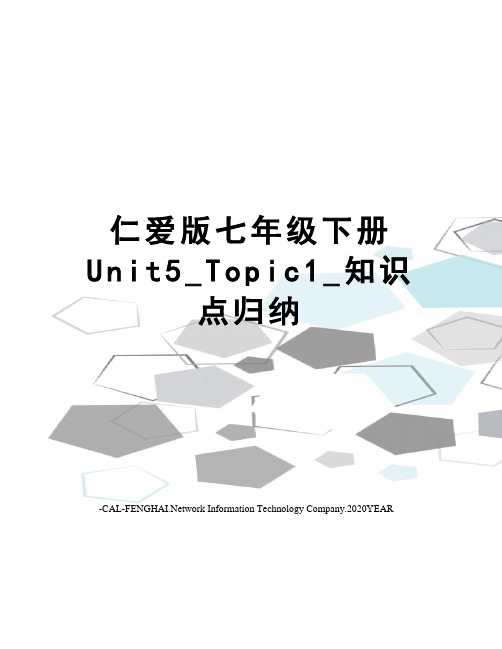
仁爱版七年级下册U n i t5_T o p i c1_知识点归纳work Information Technology Company.2020YEARUnit 5 Our School LifeTopic 1 How do you usually come to school?一、重点短语:Come on on foot take a bus by bus after school a short time listen toWatch TV know about be over in one’s free time on weekdays go to bed二、重点句型:1. I never come to school by subway.2. Maria sometimes takes the subway home.3. We usually go to the park on foot.4. I seldom walk to school.5. Li Xiang often rides a bike to school.6. They always go to the zoo by bus.7. --Happy New Year! --Happy New Year!/ The same to you.8. The early bird catches the worm.9. She goes to bed at about a quarter to ten.10. --How often do you come to the library--Three times a week./ Very often./三、重点知识点1. The same to you也祝你……。
用于别人向你祝福时对对方的回应,相当于You, too!e.g.-- Have a nice weekend!周末愉快! -- The same to you!也祝你愉快!2. look在此为系动词,表示“看起来……,看上去……”,后面接形容词。
崇明县一中七年级英语下册 Unit 5 Our school life Topic 2 A few

Unit 5 Our School LifeTopic 2 A few students are running around the playground.Section B一、教学目标1. 能根据已学语音、音标及发音规则,正确朗读下列词汇并运用于情景对话中:borrow, workbook, course, of course, use, look for, shelf (shelves), keep, must, return, on time, newspaper, Lost and Found, money, wallet2. 能用有关图书馆借阅图书的表达法进行礼貌询问以及在情景对话中表达“借书和失物招领处寻找丢失物品”等语言功能,如:(1)—Excuse me, may I borrow some English workbooks?—Of course.(2)—How long can I keep them?—Two weeks.(3)—You must return them on time.—Sure, I will.(4)—What are you doing?—I’m looking for my wallet.3. 能听懂借阅图书的简单对话并做出恰当的反应;4. 能听懂通过失物招领询问丢失物品的对话;5. 能仿照例子写出简单的失物招领或寻物启事;6. 能够根据有关图书馆借书的对话,养成遵守规章制度的意识。
二、教学重点及难点1. 正确使用在图书馆借阅图书进行礼貌询问的有关句型。
2. 仿照例子写出简单的失物招领或寻物启事。
三、教学准备教师:教学课件;多媒体设备学生:课前预习四、相关资源五、教学过程Task 1Step 1 Revision1.Write down the present participle of the following words.1) watch 2) play 3) shop 4) make 5) see 6) catch 7) get 8) begin 9) meet 10) take 11) swim 12) write 13) teach 14) tell 15) have 16) sit2. Say the words which are missing as quickly as possible.3. According to some pictures, answer the questions using the “Present Continuous”.【设计意图】通过练习,复习上节课所学的语法知识和词汇。
仁爱版英语七年级下册:Unit5Topic2.Afewstudentsarerunningar..

Unit5Our School Life Topic2A few students are running around theplaygroundSection A【学习目标】1.知识与技能:A:学习并掌握本节课生词:make-pool.通过预习达到会读、识记要求,上课时默写,要求在听写本上做好准备,标清序号(20),条理清晰,每行4个,成绩计入个人周成绩表。
只要你肯下决心并付诸行动,你一定会赢在起跑线上的!B:学习动词的现在分词的构成规律:1)在词尾直接加ing:work一working;play—playing2)以不发音的e结尾的动词去掉e再加ing;come—oming;have一having3)以重度闭音节结尾,结尾只有一个辅音字母,双写该辅音字母再加ingkid―kidding;shop—shopping;begin一beginning;run一running4)以ie结尾的动词变ie为y再加ing.die一dying;lie—lying;tie---tyingC:学习现在进行时的用法:1)句型结构:be+V-ing+...2)句型含义:正在做、、、3)特征词:look!listen!Now,at the moment...尝试翻J译:My mother is cooking breakfast她正在做家庭作业___________________________________.D:能够用现在进行时谈论日常生活场景,尝试翻译:What are you doing??We are playing basketball on the playground..2.过程与方法课前做好预习,预习中做好预测,标出不会的内容,寻求同桌、小组帮忙,聆听别人的见解,专注于老师的总结。
3.情感态度价值观:A.热爱学校,保持校园干净整洁。
B,参加体育锻炼,保持身体健康!【学习重难点】1.现在分词2.一般现在时态【学习过程】Stepl:Read la.理解并翻译下列词组或句子1.do your homework2.watch TV3.make cards.4.would like to...5.play basketball?6.Good idea!!Step2:Read la again,找出使用现在进行时态的句子并翻译,然后回答下面的问题:1.What's Jane doing?2.What's Michael doing?Step3:Look at the pictures in2b and talk about them:e.g.Picture1:Where is Mary?What's she doing?Step4Read2b.1)找出表示地点的词组并翻译。
仁爱版初中英语7下Unit 5 Our School Life 词句精讲精练

Unit 5 Our School Life精讲精练词汇精讲1. alwaysalways是频度副词,意为“一直,总是”。
它的反义词是never, 意为“从不”。
常用于一般现在时,其划线提问要用How often +一般疑问句。
例如:She always likes birthday cards. 她总是喜欢生日贺卡。
【拓展】always, usually, often, sometimes和never是英语中最常见的频度副词。
(1)always的频度约为100%,表示动作重复、状态继续,中间没有间断,意为“总是、永远地”。
例如:The sun always rises in the east and sets in the west. 太阳总是东升西落。
(2)usually的频度为约80%左右,意为“通常、平常”,即很少有例外。
例如:He usually goes to bed at ten o’clock. 他通常十点钟睡觉。
(3)often的频度为约60%左右,意为“常常”,但不如usually那么频繁,表示动作重复,中间有间断。
例如:He is often late for school. 他上学经常迟到。
(4)sometimes的频度约为40%左右,意为“有时”,表示动作偶尔发生。
可以位于句首,以示强调。
例如:It is sometimes hot and sometimes cold. 天气忽冷忽热。
Sometimes he does it this way and sometimes he does it that way.他有时这样做,有时那样做。
(5)seldom的频度约为20%左右,意为“很少、不经常”。
例如:I hardly ever go out these days. 这些天我几乎不出门。
(6)never 的频度为0,意为“从来不、永不”。
例如:My parents are never late for work. 我父母上班从来不迟到。
- 1、下载文档前请自行甄别文档内容的完整性,平台不提供额外的编辑、内容补充、找答案等附加服务。
- 2、"仅部分预览"的文档,不可在线预览部分如存在完整性等问题,可反馈申请退款(可完整预览的文档不适用该条件!)。
- 3、如文档侵犯您的权益,请联系客服反馈,我们会尽快为您处理(人工客服工作时间:9:00-18:30)。
. .
Language points
take the bus to school = go to school by bus /on the bus take the train to school = go to school by train /on the train take the subway to school = go to school by subway /on the subway ride the bike to school = go to school by bike /on his bike drive the car to school = go to school by car /in his car
walk to school
= go to school on foot
Nancy usually goes home by subway. = Nancy usually takes the subway home. = Nancy usually goes home on the subway.
bicycle ['baisikl]
ቤተ መጻሕፍቲ ባይዱ
by + 交通工具
表示乘坐这种交通工具
特殊的:on foot
work alone
— How do you usually come to school? — I usually come to school . 1. by car 2. by bus 3. by subway 4. by train 5. by boat 6. by ship school bus 7. by plane 8. by bike 9. on foot
transportation
[trænspɔː'teɪʃn]
b car y
b y
ship
on foot b trai n y b subway y
walk
b bus y
b bike y
b plane y
words
bus *bʌs+ car *kɑ:+
n.公共汽车 n.汽车
plane [plein] n.飞机 train [trein] n.火车 ship *ʃip+ n.轮船 boat *bəut+ n.小船,小舟 subway *'sʌbwei+ n.地铁 bike [baik] n.自行车
They usually go to the zoo by bus.
= They usually take the bus to the zoo. = They usually go to the zoo on the bus.
He usually comes to school by bike.
(Kangkang, Jane, and Helen meet at the school gate )
Jane: Hi, Kangkang. Nice to see you again! Kangkang: Nice to see you, too! Jane: Kangkang, here's Helen. Kangkang: Hi, Helen. Happy New Year! Helen: Hi! The same to you. Oh, your new bike looks very nice! Kangkang: Thank you. Helen: Do you often come to school by bike ? Kangkang: Yes, I do. How do you usually come to school? Helen: I usually come to school by subway. How about you, Jane? Jane: I always come to school by bus. Oh, come on! It's time for class.
group work A: How do you go to school ? B: I go to school . B: How about you? A: I go to school . C: How does A go to school? D: She/ He goes to school C: How does B go to school? D: She/ He goes to school
=He usually rides the bike to school. =He usually comes to school on his bike.
My father goes to Chongqing by car. My father drives his car to Chongqing . My father go to Chongqing in his car.
My friend go to Wuhan by train. My friend takes the train to Wuhan.
My sister go to Beijing by plane. My sister takes the plane to Beijing.
I go to Guangzhou by ship. I take the ship to Guangzhou.
Make a survey of your group ,asking together how you come to school. Then make a report to our class. Example: A: How do you come to school ? B: I often go to school by bus and I sometimes go to school on my bike .
How
on foot
by bike
by bus
by subway
by plane
A
B
C D E
often
sometimes
How about this movie?
放学了我们去踢足球怎么样?
How about playing football after school?
Adverbs of frequency
never *'nevə+ adv. 从未;决不 seldom *'seldəm+ adv. 很少,不常 sometimes *'sʌmtaimz+ adv. 有时,间或 often *'ɔf(tə)n+ adv. 常常,时常 usually *'juʒuəli+ adv. 通常,经常 100% always *'ɔ:lweiz+ adv.总是,一直,永远 0%
gate *ɡeit+ n.大门 at the school gate 在校门口
nice to see you = nice to meet you = pleased to meet you = glad to meet you
how about = what about
这场电影怎么样?
你认为...怎么样?
